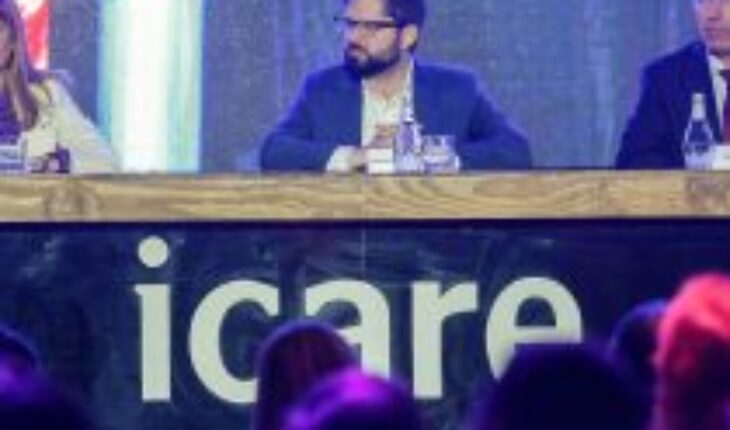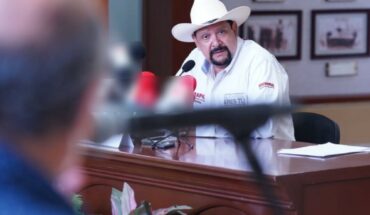Presented by:
Good and happy Thursday!
Stop the machines! Breaking news! For the first time in its history the president of Falabella is not from one of the controlling families. Carlo Solari is no longer chairman of the company’s board of directors. Former Walmart CEO Enrique Ostalé is his replacement. With the change, the conflict between the controlling families ended.
As we had been anticipating in El Semanal, Solari had become the focus of tensions due to the company’s poor results. Until Sunday it was taken for granted that Solari had the votes to continue presiding over the table, but in the end the change was decided to unblock the crisis between the controllers.
Now we return to what I had prepared. It’s Thursday, but the government has enough arguments to be doing cheerful accounts this week and businessmen should recognize it.
What do I mean? The Committee of Ministers unanimously approved Anglo American’s Los Bronces Integrated project, which means investments of more than US $ 3,000 million and may end up being the factor that prevents the economy from shrinking this year. To this we add that the parties approached on the mining royalty issue and that almost 2,000 of the most important mining executives in the world are in Chile for the World Copper Conference and CESCO Week, a sign of confidence in our mining institutions.
And now comes the highlight of the week: the new National Strategy of the Litio.Es the topic that dominates conversations in the world of mining and not only in Chile. What is announced tonight or tomorrow has global geopolitical implications – read China vs. USA. And for the government of Gabriel Boric, what is announced will be interpreted as a direct message of where his mandate is pointing. The announcement comes with political costs, because within his coalition not everyone agrees that the private sector should continue with an important role. On the other hand, the private sector fears that what is announced will give too great a role to the State. What there is agreement on is that we have to move fast, because we are facing a historic opportunity.
All this in the context of the news that China, Chile’s main trading partner, grew well above expectations in the first three months of the year. The government also scored a political triumph by reaching an agreement with the CUT for a progressive increase in the minimum wage to $500,000 by July 2024. That would be a 22% increase in 15 months.
Now, all these “good vibes” should serve to move Boric’s two major reforms forward. I am referring to tax and pensions. The first, in its original version, is dead. However, a new version is already cooking (in the best sense of the word) and there is optimism that before the end of the year it will come to fruition. The second, as proposed by La Moneda, is stopped and I would dare to say that it is in the ICU.
Key to unlocking the talks in the pension and that rapid progress is made in the tax will be the result of the election of the 50 constitutional councilors. But it looks complicated. In an interview with Lorenzo Gazmuri – which I share in this edition – the former president of Icare warns his sector: “There is no better opportunity for the right than negotiating a social pact with a left-wing government in La Moneda.” Reaching the end of the year without any progress gives more space to extremes and populism.
And it is in that framework that the President is at the ENADE 2023 this Thursday. It does so together with the heads of the Ministries of Finance and the Interior. The most important business event of the year generates more expectation than in recent years, since both the organizers and La Moneda want the meeting to serve as a turning point.
Before starting with what summons us, I want to invite you to share or join El Semanal, and El Semanal Exprés, so that our community continues to grow. Subscribe or share this newsletter.
1
1- TWO REFORMS IN SEARCH OF AGREEMENTS
President Gabriel Boric goes to Enade 2023, this Thursday, to try to seduce the main businessmen and executives of the country in terms of his Government wants to move towards a social pact, and that it serves as a turning point to unblock the talks and thus be able to advance in the two major reforms of his administration: tax and pensions.
The meeting, as we anticipated in Sunday’s edition, occurs less than three weeks after that we vote for the 50 members of the Constitutional Council, who will be the ones who will have the responsibility of drafting the new proposal of the Magna Carta, in the midst of a tense political climate, slowed investment (except foreign), rising unemployment, inflation not yet completely controlled and with the crisis of citizen security taking over the agenda.
In Icare they say that the focus of the event will also be focused on the need to reach large and transversal agreements. The new president, Karen Thal, has been clear on the urgency of reaching transversal agreements, since, if we fail, “we can perfectly reach a 2023 with a rejected Constitution, without tax reform, without pension reform, with the crisis of citizen security without progress”.
Let’s start with the positive. “They were very intense dialogues,” is a phrase that is repeated among the participants of the Tax Dialogues. There were six sessions with high call. There is consensus that they were positive and served to set the stage for when the government presents its new proposal. No one is saying that there won’t be tough times, but several of those who participated, including representatives of big business, say it was a breakthrough.
“We saw an environment that lends itself to reform. We have been financing permanent expenses with debt for 12 years,” says a senior Treasury official.
They emphasize that there was consensus that the SII needs more resources, more personnel, more technology and that “is very profitable to collect. It helps to combat evasion and increase the rate of taxpayers,” says one of the participants.
From the unions they make a very good diagnosis of the role of Francisco Saffie, the representative of Chile to the OECD who came to take charge of the dialogues. They also highlight how the Government Laboratory worked. “He made a very good hit and with a high degree of objectivity and acted as referees. It was good not to do them from the Treasury. They moderated and took notes,” is how they describe their role. “They were all 28-year-old goats with very good and productive work schemes,” they add.
Wealth tax. A source who was part of the six sessions points out that even the CUT opened up and acknowledged that there are technical problems and that there are better options. The wealth tax was one of the opposition’s red lines.
What was not discussed was what the CPC, Sofofa and the rest of the business associations describe as “the red line” of any tax reform: the tax on retained profits. Treasury sources emphasize that there was no prepared agenda and that both the CPC, the accountants, as well as the Bar Association did not take the opportunity to put the issue on the table. “Generating an open agenda was the mandate. The objective was not to talk about the bill but to show the need for tax reform, “explains a person who participated in the meetings.
The poor evaluation of the role of the helmsman of the National Multiguild of Entrepreneurs, Juan Pablo Swett.Both from the Treasury and the private ones who participated affirm that it was disruptive and that his statements in the press do not reflect what was advanced, while emphasizing that he did not share with anyone his criticism during the meetings and, In addition, he skipped the last two of the six sessions without warning.
If there is now optimism about the tax reform, the pension reform is in the Intensive Treatment Unit. No one says it publicly, but in the government’s economic team they admit privately that, as the project now stands, the votes are not there.
An analyst who knows the industry well and with networks in La Moneda makes the following analysis:
The votes for the notional accounts are not there and at least half of the additional 6% would have to go to the individual accounts.
The AFPs are emboldened and bet everything to keep the administration business and take advantage of “the freedom to choose”. And, unlike other times, they are quite united in the bulk of their arguments, although there are nuances between what the most extreme and the “most progressive” think.
And there is growing opposition, including from center-left experts such as Guillermo Larraín, Eduardo Engel and Andrea Repetto.
The right withdrew from the technical table (although what Chile Vamos proposed is unpresentable).
The PGU took away the urgency because there is no longer anyone in misery who does not receive at least 200,000 pesos.
From the industry they emphasize that even the PC was picked up and now does not want the scheduled withdrawal to be eliminated. “Ideally, a new one should be made,” says the president of one of the AFPs who believe that it is urgent that there be changes. “It would be very bad if there are no reforms. The system has to have legitimacy”, but with financial and social sustainability.to the.
Labor Minister Jeannette Jara says she is optimistic about eventually reaching an agreement, using the 40-hour agreement as an example, although she admits that “although the positions are mixed, we appreciate that the opposition has made its proposal. As a government we are open to dialogue to reach an agreement that allows us to move forward with a pension reform that substantially increases current and future pensions.”
The minister affirms that from the government they are open to other proposals. “As long as it is demonstrated that with other proposals current and future pensions will rise by the same or greater amount than with the reform we have presented, we have no red lines,” they say.
If you want to know the full story, subscribe to El Mostrador Semanal and join our community.
2
2- THE WEEK IN WHICH MINING “TAKES IT”
What happened?. We anticipated it in the edition of El Semanal on Sunday and it is being fulfilled: mining took the economic agenda of the week, in particular that of copper. But the 15 minutes of fame are over tonight or Friday, when President Gabriel Boric announces the long-awaited National Lithium Policy.
Let’s go in parts. On Monday the Committee of Ministers approved with unanimous vote the project for the expansion of Los Bronces of Anglo American and in which Codelco has 20%. The OK means US $ 3,500 million in investment and analysts are already making calculations and estimate that the investment would contribute between 0.3 percentage points to growth this year (BCI). That contribution represents the difference between negative growth and a returning economy.
This Tuesday the protagonism was taken by the discussion, in the Senate Finance Committee, on the royaltyThere was no agreement with the opposition and the Government insisted with its modified proposal to adjust the ceiling on the effective payment of taxes for mining, so that, adding all the taxes, the maximum burden does not exceed 48%. There are some estimates that the average would be 42%.
The bill should be approved in committee this week and could begin discussion on the Senate floor as early as Friday. No one dares to say how that vote will turn out. From the opposition they have already warned that they aim for the maximum tax burden to be lowered to 43%, although what plays in favor of La Moneda is that there is a transversal consensus that the royalty must be raised and, also, that there are certain agreements in the formula to be used to collect it.
From the industry they push for greater changes. Thousands of the most important executives in the industry are in Santiago this week at the World Copper Conference and CESCO Week, the main event of the sector in the world, and there the royalty is a must. BHP says it is seeking more concessions to trigger $10 billion. The official dinner had more than 1500 attendees and last night there was no room for a pin. It is estimated that around 30% of those who attended are from Chinese miners and traders.
The harsh response of Mario Marcel.He stressed that, with the new indications, the average tax burden in Chile would be below those of Peru or Australia, which are between 43% and 44%. “What this tells us is that, at least in terms of average burden, we would not become the most burdensome country in the world, or have the highest tax burden in the world on mining,” he said.
Now it’s lithium’s turn. After months of promises, this Thursday night or tomorrow Friday, on national television, President Gabriel Boric will finally announce the new National Lithium Strategy and the creation of the National Lithium Company. Both among the private sector and in La Moneda there is consensus that we are facing a historic opportunity for a key industry for the transition to a green economy.
The government has already been clear that the private sector will play an important role. The State’s interlocutors will initially be Codelco, Corfo and Enami. The focus of the National Lithium Company will be to articulate future public-private action efforts. Bloomberg reported this week that Codelco and Enami are already in talks with private sector companies to exploit lithium deposits in the country.
What to do with MCS and the Atacama salt flat. These are the most difficult dilemmas. The president would already have problems with the most progressive wing of his coalition, from where they press for the nationalization of lithium and for the State to be the main producer. To this controversy we must add the one generated by his decision about what to do with the SQM contract in the Atacama salt flat, which ends in 2030. There are rumors that La Moneda would offer to extend it for 20 or 30 years, in exchange for taking away a third of its exploitation rights and tendering that third to private companies.
If you want to know the full story, subscribe to El Mostrador Semanal and join to our community.
3
3- A TALK WITH A BUSINESSMAN WHO LOVES BORIC
Lorenzo Gazmuri: “There is no better opportunity for the right than to negotiate a social pact with a left-wing government in La Moneda.”
The influential businessman says that this pact would be much more durable over time and warns that the problems that triggered the social outbreak are still there.
The former president of Icare was this week’s guest at La Mesa de El Mostrador, on the eve of President Gabriel Boric’s visit to Enade.
Historical man of the Angelini group, Gazmuri is optimistic that we will have a tax reform, advances in pensions and a new Constitution at the end of the year.
And his optimism is based on the fact that “the Boric of today is very different from the one that won the elections” and that businessmen understand that Chile has to move to a social state of law.
To see the full interview click on this link or on the image.
A message from SQM
For more information click on the image
SQM, Innovation and Technological Development of Chile to the world
SQM is a global company that operates from northern Chile in the regions of Antofagasta and Tarapacá and is recognized for its values of excellence, safety, integrity and sustainability, as well as for its high levels of competitiveness and innovation in its business areas.
It is a company that is a world leader in the production of potassium nitrate and iodine, and one of the largest producers of refined lithium. It also works on specialty plant nutrients and solar salts. SQM products are sold in more than 110 countries through a strong global distribution network.
SQM is present in cutting-edge industries, but above all in people’s daily lives to improve their quality of life. Its hallmark is the innovation and high added value of its products that are essential in technology, food, health, and renewable energy industries. SQM employs more than 240 professionals dedicated to research in the different lines of business, of which about 15% have master’s or doctoral postgraduate degrees with expertise in basic sciences and engineering.
The company, which since its inception has developed its own production processes, has piloting plants in iodine and nitrates and also in lithium. In this area, since 2015, conventional and unconventional technologies have been evaluated with tests of Direct Extraction of lithium and other mechanisms in Salar de Atacama, and purification and direct conversion of brines to lithium hydroxide in the lithium chemical plant of Antofagasta.
For more information click on this link in the image above.
4
4- NO CLEATS OR TIES, EXPRESS
– BCI, Natura and Colun lead the ranking of the most responsible companies in environmental criteria, with workers, customers and society and at the ethical and corporate governance level (the controversial ESG criteria). It is the result of the annual ranking of the Corporate Reputation Monitor (Merco), which evaluates the 100 most responsible companies in these environmental areas.
The report was based on 33,563 surveys of workers, consumers, business leaders, sustainability experts, financial analysts, journalists, government representatives, NGOs, trade unions, consumer associations, digital media and influencers.
Women in power. Among the most relevant findings is that the percentage of women who participate in boards went from 19.96% in 2021 to 21.17% in 2022. At the level of workers, the valuation of companies is positive in terms of inclusion of female talent and tax contribution.
The bad news: the general assessment of experts in corporate social responsibility operating in Chile fell in all its indicators, with the best evaluated areas being the following: ethics, good governance and responsibility to employees; and the lowest: commitment to the environment and contribution to the community.
If you want to know the full story, subscribe to El Mostrador Semanal and join our community.
– The economic cost of the crime crisis in Chile. The analysis was made by Jaime Troncoso, of the Diario Financiero, with the help of experts from the Usach and the University of Talca, the Undersecretary of the Interior, Manuel Monsalve, and the National Prosecutor, Ángel Valencia.
The conclusions. The report concludes that, to be prepared for crime in Chile, it must be spent in the order of 3% of GDP, that is, about US $ 9 billion. Troncoso explains that the amount is equivalent to building 18 Costanera Center buildings or three Metro Line 7.
– Some fissures appear between the Central Bank and the Ministry of Finance. We talked about monetary policy. Minister Mario Marcel wants the BC to start to cut rates to boost the economy, while the issuer is clear that, until it is sure that inflation is controlled, the Monetary Policy Rate (MPR) will remain where it is: at 11.25%.
It is something that is commented in Sanhattan and made public in its latest report by the influential consulting firm Gemines, in which it highlights that Rosanna Costa “came out, without mentioning it, to the step of the Minister of Finance who, according to his current function, tries to push expectations, pointing out that the worst of the adjustment is over.”
For her part, the president of the Central Bank was very clear, in her latest presentations and interviews, that the economy has adjusted insufficiently, “even more so considering that the revision of figures for 2020-2022 brought the surprise that consumer spending was US $ 4,300 million higher than previously estimated” and that the product gap has not yet been closed. In addition, he emphasized the absolute lack of progress in core inflation (without volatiles).
– What is talked about at the money tables. Auto loans hitting factorings hard and there is a quiet fear in Sanhattan that the problem, coupled with what is happening with builders, rate hikes and higher funding costs, will have a ripple effect on the industry. The most exposed would be Global Financial Solutions, in which LarrainVial has an important stake. León Vial is one of the directors. It was in violation of certain covenants and would have to be injected with capital again, although close to the company assure that the worst is over.
A report by Feller Rate, the risk rating agency, warns that delinquency greater than 60 and 90 days jumped in 2022 and analysts project a more complicated 2023.
Presented by:
That’s as far as we get this week. Before closing, remember that if you have any comments or information to share with us, write to me at ivan@elmostrador.cl or in my networks.





